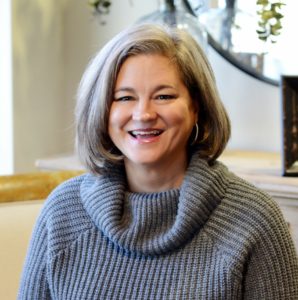
Wanna make a bet? I’ll bet you most people couldn’t care less that we are still in a public health emergency. The field that is very aware of this extension, is without a doubt, long-term care.
But our burden has not been lifted. Many of our residents have yet to see their caregivers’ smiles. In many ways, the assumption we cannot effectively manage infection control without an undue amount of oversight lingers and won’t go away.
Like so many of you, we have been looking for ways to heal and move on, despite the regulations not changing fast enough.
We recently held a Night of Transition and Blessing. This event was a chance for us to offer some closure and honor, and remember what we’ve been through. We wanted to offer hope and move on.
I must admit writing this out was therapeutic for me. I hope some of the words are for you as well. I’ve been avoiding looking back, mainly because it’s difficult to do. It’s tough but necessary, and I find myself in a place of appreciation, determination, and frustration.
The best way I can describe living through the pandemic with all of you is:
The season of invisible scars.
While we are certainly still living through a pandemic (frustration), in my mind the “season” has passed. I believe there are seasons in life, some longer than others, some very quick but life-changing. This season was the longest, quickest season of my life. Long because it seemed as though it would never end. Quick, because looking back, I am shocked and amazed at how we all lived through such a time of uncertainty, fear and weariness. We made decisions in minutes. Some good decisions, some not so good. We learned at such a rapid pace.
We have adopted a new vocabulary. One that, prior to March 13, 2020, no one was well versed in. Now, these words and phrases are commonplace: Pandemic, controlling the spread, 6 feet apart, symptoms, exposure, PPE (Personal Protective Equipment), N95 masks, gowns, face shields, eye protection, testing, surveillance testing, mass testing, county positivity rates, window visit, chat boxes, Facetime, Zoom, vaccines, mandates, boosters. Even listing these words is annoying and repetitious. We know them all too well.
Forging toughness
But it was a season, and if you are reading this, you’ve lived through it, and I believe we are all tougher for it.
Often team members heard me say, “Someday, you will tell your kids and your grandkids you were on the front lines of the coronavirus pandemic.”
You were a warrior, you put other people’s needs ahead of your own. Many people can’t and won’t do that, especially for any length of time. WE HAVE DONE THAT. You fought and showed up for the most revered people: the seniors we serve.
Seasons of life are often marked visibly, our bodies change. For me, my weight went up, and my hair dye went in the garbage. The time certainly marked me in many ways.
This is this season of invisible scars.
“A scar is a mark that is left on the skin after a wound or an injury to the surface of the skin has healed.”
We haven’t healed completely, but we are on our way and sharing together is one way to get there.
Scars below the surface
The scars we suffered have been many since March 2020.
Scars of the unknown and known. The scars of residents we lost related to COVID. You bet that has left a scar.
Scars of guilt… telling families and loved ones to stay home. How could we keep you from each other? How did we let this happen for so long? We did the best with the information we had at the time, but the damage isolation had done to our residents in some cases was just as bad as COVID, and we let that happen. We all felt alone at times, isolated, worried and unsure. Guilt… yes, it left a deep scar.
Tiredness, burnout, decision fatigue, some team members worked days on end hundreds of hours of overtime. Our team members paid a price and others quit.
The cost of working in long-term care has a huge emotional price tag. Are we doing enough? Will more leave? Will we be able to continue to serve as many people as we would like to? Has this left a scar? This wound remains open.
You may not physically see these scars. As I said before, they are invisible but make no mistake, they are on us all. Residents, families, team members… we all have them and acknowledging them I believe is the first step in healing. Scars cannot be removed completely, but they can become less visible over time.
I’m not one to have tattoos. Many times people get inked to remember a time, place or event, or maybe even a season in life. The invisible scars COVID has left are just as meaningful if not even more powerful. They are a part of us… we can’t see them, but they are felt.
As we look toward closing this season in our life, I’m embracing the scars as beautiful remembrances of a crazy time in life. I will display them proudly and walk away with a renewed sense of purpose and passion. We are the ones who stuck it out. We grew to know and love each other even stronger.
We value times together even more than we did prior to March 2020. We won’t take anything for granted again. The parties, the celebrations, the hugs, the laughter without masks. We understand and appreciate how quickly it can be taken away when the unknown sets up shop. We are committed to doing better and not accepting what we are told without asking the challenging questions.
We can and will persevere. We know so much more now.
Now if we could only be recognized for the work and were allowed to care for the seniors we serve with the utmost respect for infection prevention — but with emphasis on quality of life, not regulations.
Julie Thorson was the 2018 recipient of the LeadingAge Dr. Herbert Shore Outstanding Mentor of the Year award. She currently co-facilitates Leadingage Iowa’s Leadership Academy. She is a Leading Age Academy fellow and former coach. The Head Coach (president and CEO) of Friendship Haven, a life plan community in Fort Dodge, IA, Thorson is a coach’s daughter at heart. A former part-time nursing home social worker, she is a licensed nursing home administrator and completed Leading Age’s Leadership Educator Program in 2019.
The opinions expressed in McKnight’s Long-Term Care News guest submissions are the author’s and are not necessarily those of McKnight’s Long-Term Care News or its editors.




